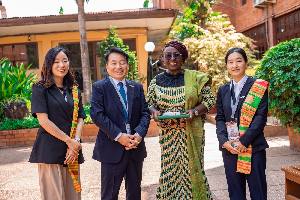“When you choose to make children, you don’t get to decide what that child should be,” declared Minister for Tourism, Culture and Creative Arts, Abla Dzifa Gomashie, as she opened a Regional Workshop on the Interpretation of World Heritage in Africa on Monday.
“Let this inspire parents and all of us in the creative space. You can be anything you want to be if your heart follows.”
Her reflection on the value of nurturing creative talent set the tone for the week-long gathering at the Coconut Grove Regency Hotel in Accra, which has convened heritage specialists, culture professionals, and partners from across Africa and beyond.
The workshop is organised by the Ministry of Tourism, Culture and Creative Arts, in collaboration with the Ghana Museums and Monuments Board (GMMB), the African World Heritage Fund (AWHF), WHIPIC, the Ghana Commission for UNESCO, UNESCO Accra, and supported by the Korea Heritage Service.
Gomashie on behalf of the President of the republic of Ghana, H.E. John Dramani Mahama welcomed participants to Ghana and emphasized the country’s pride in hosting a programme dedicated to strengthening heritage protection, management, and interpretation across the continent.
She highlighted the importance of going beyond dates and chronology to interpret heritage in ways that connect communities to their past and empower them to tell their own stories.
“We must be in charge of our own narrative,” she said. “Until the lion learns to write, the story will always glorify the hunter.”
The Minister also celebrated Ghana’s recent success in securing UNESCO World Heritage status for the Amphitheatre textile tradition, calling for interpretation approaches that uphold authenticity, inclusiveness, and the leadership of local custodians.
Heung Nyeon Kim, Deputy Director-General of WHIPIC, expressed appreciation for Ghana’s hospitality during what he described as his first visit to an African country.
He said he was inspired by the warmth and creativity of the Ghanaian people and reaffirmed WHIPIC’s support for African professionals exploring more inclusive and community-driven heritage interpretation approaches.
Dr Albino Jopela, Executive Director of the African World Heritage Fund, thanked the Government of Ghana for hosting the workshop and stressed the urgency of reframing African heritage narratives.
Despite being the cradle of humankind and a global biodiversity hotspot, Africa accounts for only 154 of more than 1,200 World Heritage Sites. Many of these sites, he warned, still carry colonial-era interpretations that do not reflect African identities or cultural worldviews.
“Re-thinking interpretation must not be seen as secondary; it is central to why we, as Africans, should care about these sites,” he said.
Participants, including site managers, cultural officers, and technical experts, will spend the week examining strategies to improve heritage communication in line with UNESCO’s Culture 2030 Indicators and global development goals linked to education, tourism, culture, and community empowerment.
Amongst other important speakers at the opening includes Edmond Moukala, UNESCO representative to Ghana, Dr. Osman Tahidu Damba, Secretary General and Ghana Commission for UNESCO. Also present were, Joseph Amoah, Chief Director, Directors, Agency Heads and staff of the Ministry of Tourism, Culture and Creative Arts.
The workshop is expected to produce actionable recommendations to help African member states enhance interpretation practices, preserve authenticity, and safeguard heritage sites as living sources of identity and resilience.



